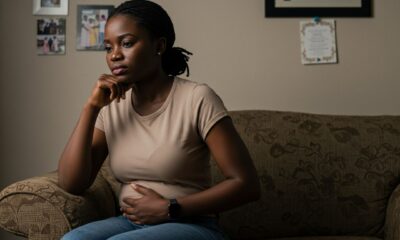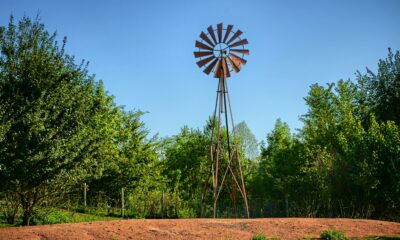Features
16 Women Leaders Championing Earth’s Restoration Make the 2023 Global Landscapes Forum’s List
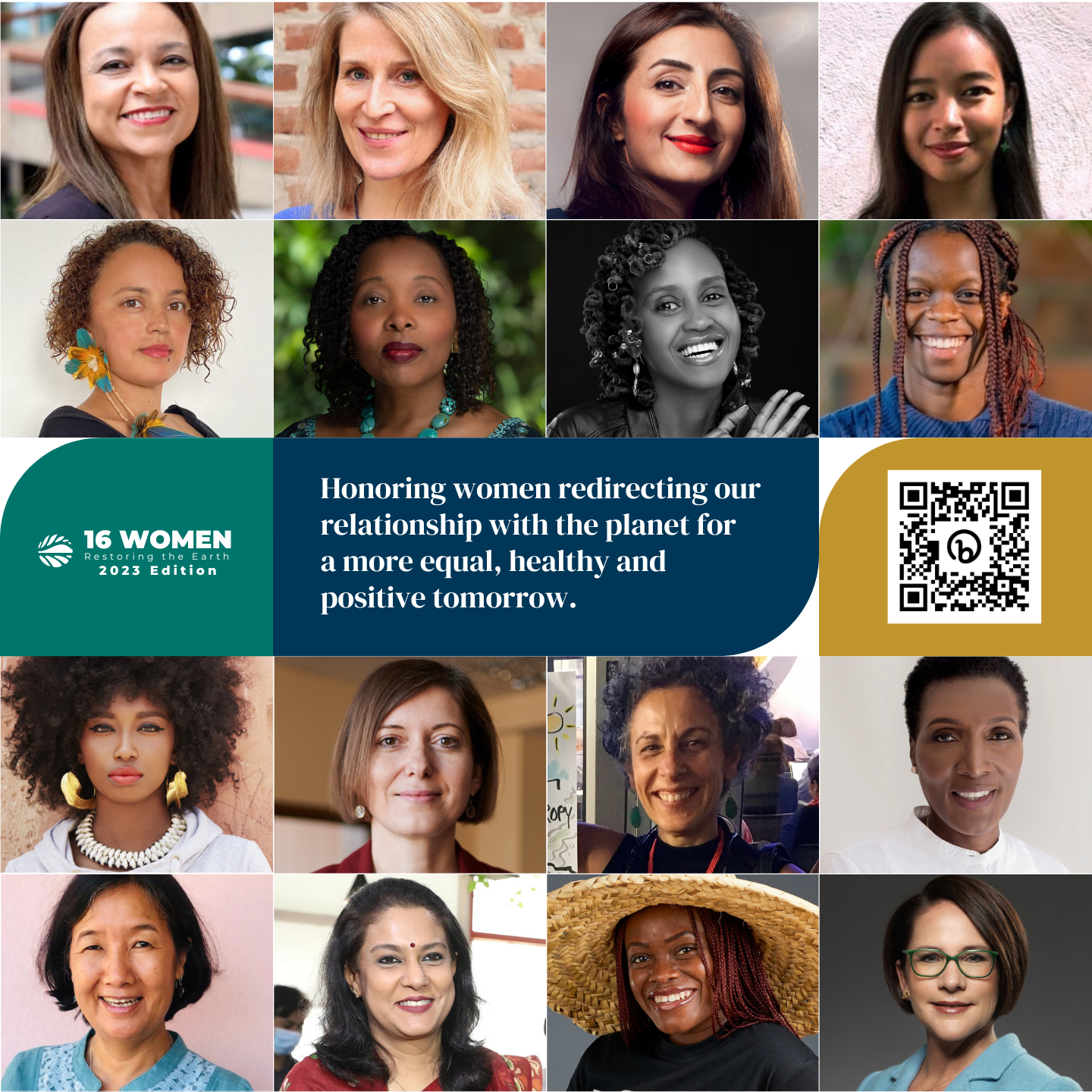
Annually, The Global Landscapes Forum (GLF) in its fourth campaign honours 16 women driving significant impacts in restoring the world, and this year is no different. While humanity struggles to cope with successive crises, these women are working on solutions to tackle one of the most serious challenges facing our species: climate change.
It is remarkable that The Global Landscapes Forum (GLF) has unveiled its fourth annual list of climate leaders from around the world as we celebrate Women’s History Month.
These outstanding women are the faces of innovation in science, technology, art, public policy, sustainable business, environmental activism, journalism, litigation, climate finance, international climate treaty negotiations, and grassroots ecosystem restoration across the globe.
Meet some of these inspiring women
Éliane Ubalijoro – The Leader
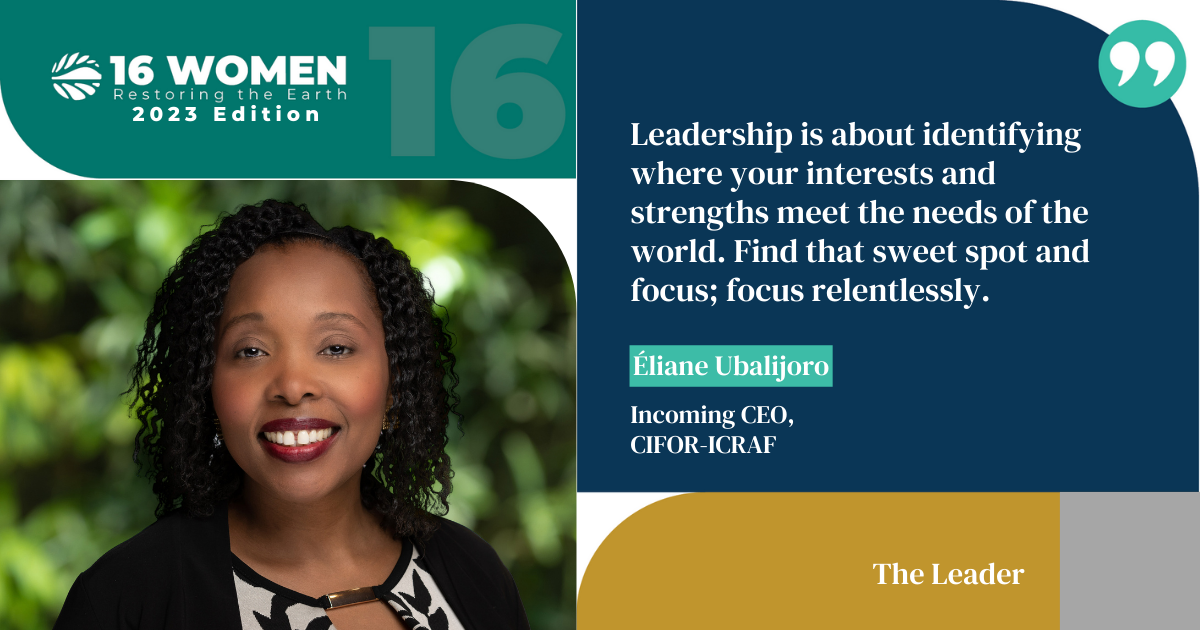
As a woman, Rwandese-born Éliane Ubalijoro has always known her place. And that place has been heading molecular diagnostics and bioinformatics teams in a biotech company, teaching leadership development at McGill University in Canada, and harnessing digital innovation for human well-being and planetary health.
During her undergraduate studies in Canada, Ubalijoro single-mindedly focused on finding out how science could help improve the lives of farmers. Three decades on, as director of the think tank Sustainability in the Digital Age, she is overseeing research on cutting-edge technologies that help smallholder farmers in Africa to boost productivity while protecting soil health and adapting to climate shocks.
“My love for research, for innovation, and for Africa made any barriers I faced along the way dissolve,” she says. And there were plenty of barriers to face—especially during a five-year stint in the biotechnology industry. “Working as an African woman scientist was a shock: in the late 1990s and early 2000s, I saw no one who looked like me at my level of leadership or above,” she said. Despite having a supportive team, that occasionally led to isolating situations.
From May, Éliane Ubalijoro will also become the first African woman Director General of a CGIAR Research Center (World Agroforestry (ICRAF)) and CEO of two Centers (ICRAF and its merged counterpart, the Center for International Forestry Research (CIFOR))—in the global research partnership’s 52-year history.
“Leadership is about identifying where your interests and strengths meet the needs of the world. Find that sweet spot and focus; focus relentlessly,” says Ubalijoro, who in her upcoming role seeks to combine the power of artificial intelligence and high-resolution satellite data with CIFOR-ICRAF’s knowledge in forestry, ecology, and regenerative agriculture.
Read more here.
Eva ‘Kandi’ Makandi – The Educator
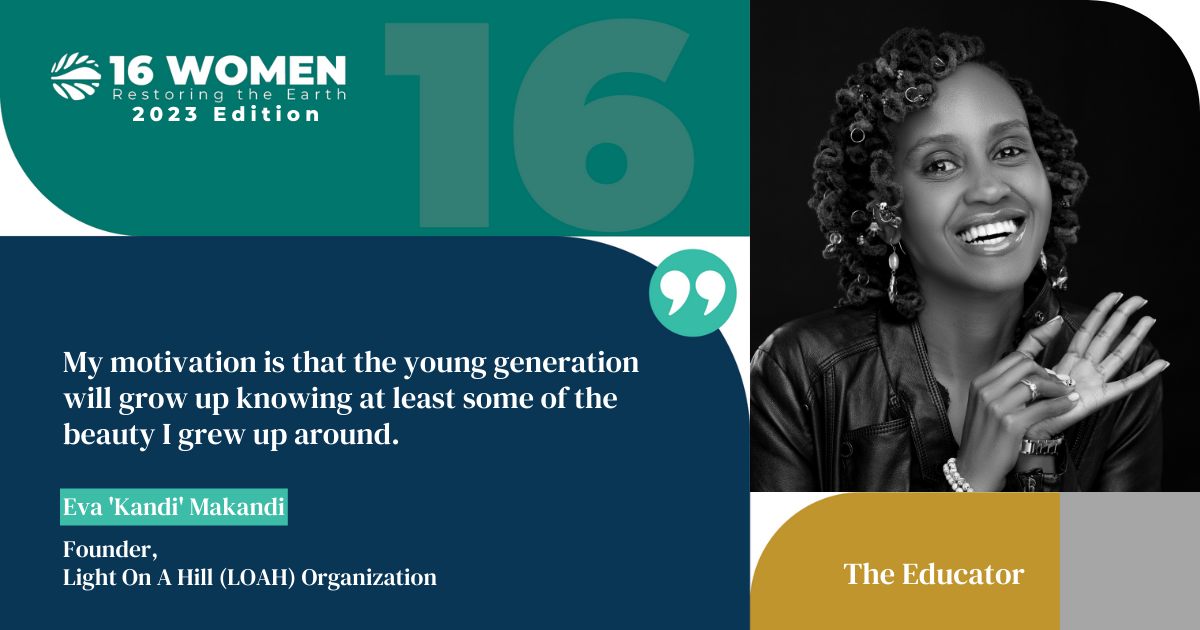
Growing up in a rural community in Kenya, Eva ‘Kandi’ Makandi regarded nature as a member of her family. “The farms’ outputs provided our school tuition, and the diverse fruits and berries were our daily go-to,” she said. “We played in the forests, swam in the nearby streams, and made planes from wheat and maize leaves. The scars on my knees bring back all the fond memories.”
But as time passed, she gradually saw her home’s landscape degrade, noticing how its forest cover, biodiversity, and farm yields diminished. For this reason, she decided to take action and founded Light On A Hill, an organization centered on environmental conservation, education, and talent development in her community. Her work has seen her establish a tree nursery, collaborate with schools to plant trees, and conduct clean-up events. She was one of the Global Landscape Forum (GLF)’s 2022 Restoration Stewards, and through this platform has shared advice and experiences on community restoration.
“Education is very key in transforming mindsets and evoking change,” said Kandi, who sees educating young children to love nature as among her most important missions. After more than two years of working with her community’s children, she sees them now encouraging their parents and peers to grow trees, establish kitchen gardens, and abstain from littering. My motivation is that the young generation will grow up knowing at least some of the beauty I grew up around,” she said.
Ineza Grace – The Activist
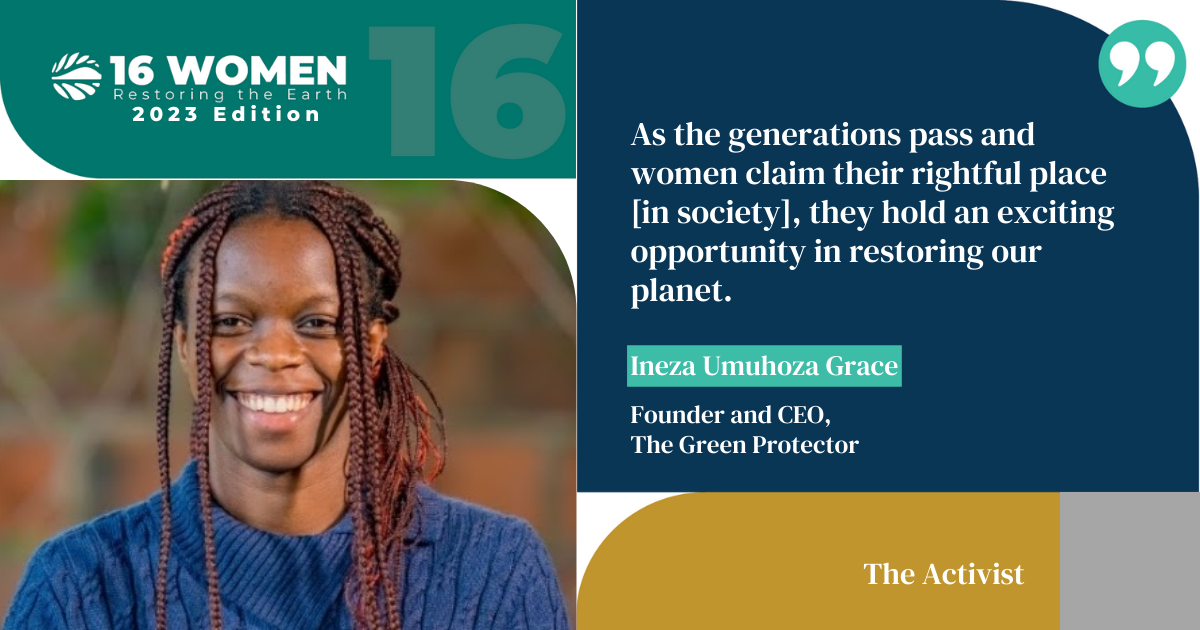
Ineza Grace, a climate justice advocate in Rwanda, believes climate change is not just a planetary crisis – it is also a deep injustice. While wealthier countries tend to emit more greenhouse gas emissions, poorer countries that have contributed little to global warming are hit by the extreme weather and economic damage it causes. Women are disproportionately affected by climate change, and young people are expected to live most of their lives trying to cope with a problem passed down to them by older generations.
“We are living through a climate change crisis that is unjust but a daily reality for vulnerable communities who did little to contribute to its impacts. I am part of a generation that doesn’t want only to blame, but to engage in action too,” said Ineza Grace.
Ineza has made it her mission to inspire other young people to demand climate justice and advocate for concrete climate action. She is the founder and executive officer of The Green Protector, a Rwandan organization dedicated to encouraging young people to get involved in environmental protection at national and international levels. She is also the co-founder and global coordinator of the Loss and Damage Youth Coalition, which aims to pressure decision-makers to take concrete action on loss and damage, through training programs and sharing youth perspectives and advocacy in the international political climate change process. The group has recently had success in working with partners to support an active decision-making process that helps direct funding to young people on the frontlines of climate impact who are engaged in action to address loss and damage in their own contexts.
Ineza believes that women are essential in the fight against climate change, and can lead the concrete change needed to achieve climate justice. “Women remain the holders of natural history and embrace the protection of the environment. As the generations pass and women claim their rightful place in society, they hold an exciting opportunity in restoring our planet.”
Inna Modja – The Artist
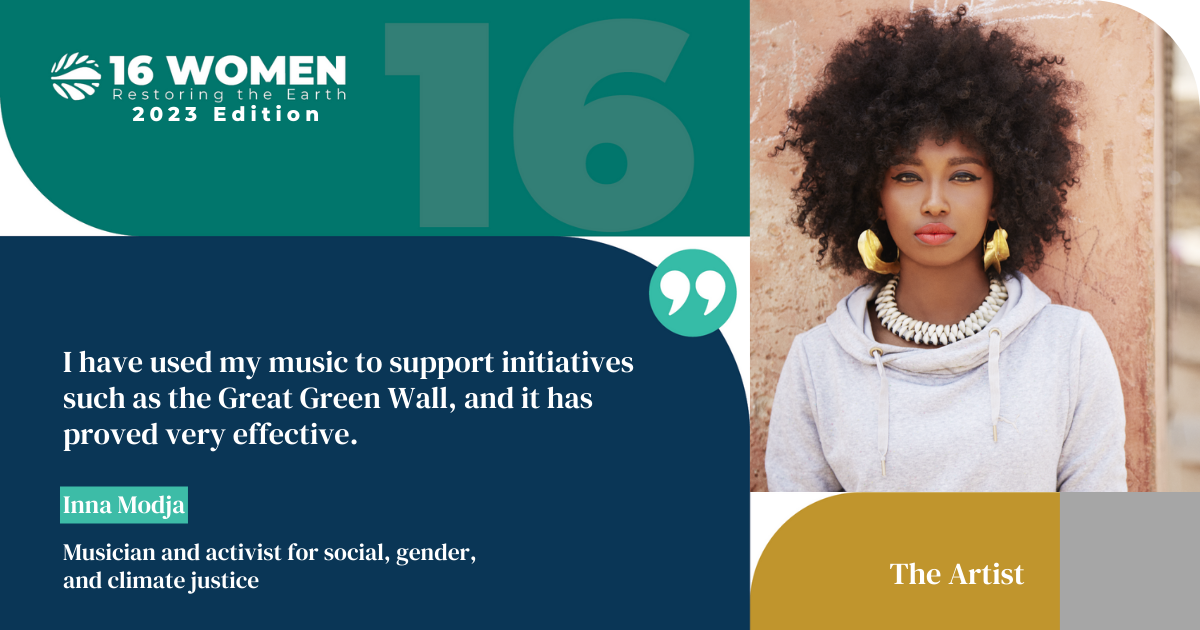
Malian-born Inna Modja is described as a musician, an actor, an artist, a United Nations Convention to Combat Desertification Land Ambassador, Chief Executive Officer of Code Green, and an entrepreneur in the Web3 space, dealing in one-off digital works of art to fund green and social projects. But at heart, she is an activist.
“Growing up in the Sahel, I witnessed the land degradation caused by a changing climate, and saw how women and girls were disproportionately suffering the consequences,” she says. “I quickly realized you cannot dissociate women and girls’ rights from climate change activism.” So, she took up both of these causes.
She started her musical career under the auspices of iconic artists Salif Touré and Oumou Sangaré before moving to France to study law. In between, she starred in a documentary titled The Great Green Wall, about Africa’s ambitious project to restore degraded landscapes in the Sahel. By holding back the expansion of the desert, the initiative seeks to counter food insecurity, conflict and forced migration.
Modja is now a Land Ambassador for the UN Convention to Combat Desertification (UNCCD) and a campaigner for gender equality and the end of female genital mutilation. To get the message across, she taps into her creative self.
“Art — be it music, films or paintings — is a powerful tool to unite people and create global movements,” she says. “I have used my music to support initiatives such as the Great Green Wall, and it has proved very effective.”
Despite the challenges and inequities, she addresses every day, Modja remains optimistic. Asked about her message for girls in Africa and beyond, she writes words that read like lyrics—waiting for a voice and a kora (the stringed West African instrument that features in much of her music) to bring them to life.
Moky Makura – The Storyteller
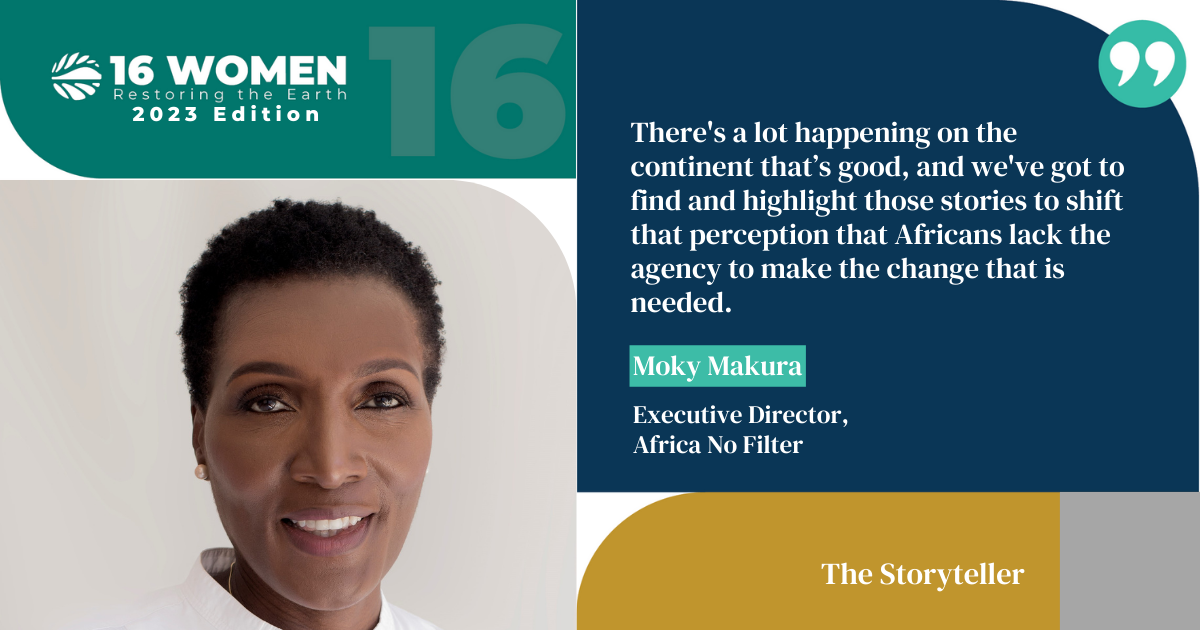
As a TV presenter, producer, author, and publisher, Moky Makura has told the story of some of Africa’s most successful global entrepreneurs, profiling visionaries who are leading the continent into a more prosperous and equitable future.
But media portrayals of Africa as a continent without agency remain pervasive. “The stereotypical narrative says that we lack agency, that somehow everything that happens to Africa is worse than anywhere else,” says Makura, who was educated in England and has lived in Lagos, London, and Johannesburg. “And yes, in the case of climate, we will feel the impact here. But what is missing from this narrative are the stories of the Africans working on climate initiatives,” she says. “There’s a lot happening on the continent that’s good, and we’ve got to find and highlight those stories to shift that perception that Africans lack the agency to make the change that is needed.”
So, the Nigerian-born media expert set out to support stories highlighting the individuals and organizations who are taking climate action across the region. As executive director of the donor collaborative Africa No Filter, Moky Makura backs journalists, artists, and media platforms that are producing nuanced, contemporary stories — those with the power to transform harmful perceptions within, and about, Africa.
Makura started her media career as the African anchor and field reporter for a South African news show and went on to author best-selling business books, create a fiction series to encourage young Africans to read, and work as deputy director of communications for Africa at the Bill & Melinda Gates Foundation, among other roles. Now, as public spaces are opening up for women, she encourages them to make their voices heard so their perspectives can shape more balanced and inclusive global narratives.
“The more women speak out, the more others are inspired,” she says. “If you are a woman in a leadership role in your community or organization, do share your expert voice. Women have traditionally been victims in a lot of storytelling, but that is changing – and more still need to.
Violet Amoabeng – The Entrepreneur
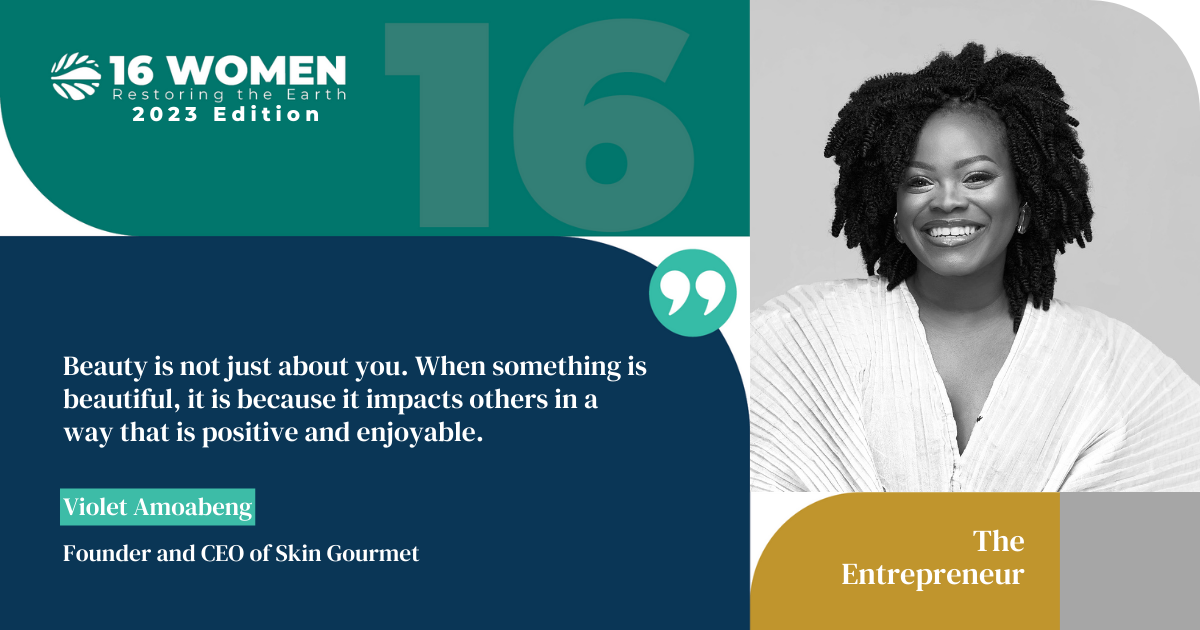
Look on the back of any skincare product, and you will likely find a label showing dozens of ingredients that most people don’t know and can’t pronounce. Most are not edible. One Ghanaian entrepreneur wants to change that: she’s developed a line of products from traditional West African ingredients – think shea butter and baobab oil – that are literally ‘good enough to eat’.
Violet Amobeng is the founder and CEO of the skincare company Skin Gourmet, which prides itself on its social and environmental ethos. “Our philosophy is ‘people over profit’,” she says, “because without people there would be no profit, so preserving their environment and health is the best way to sustain profitability.”
The USD 278 billion beauty industry can leave an ugly environmental impact. Chemicals used commonly in sunscreens can harm corals; ingredients such as palm oil are often linked to land degradation. Billions of cosmetic products sold each year are packaged in plastic, much of which ends up discarded as waste.
Violet Amoabeng says that Skin Gourmet aims to boost African economic growth and create decent jobs and that its ingredients are sourced sustainably. Handmade products are sold in recyclable packaging, and customers are given discounts for returning containers for refills. In 2021, Amoabeng was among the top ten finalists of the Jack Ma Foundation’s Africa’s Business Heroes competition.
“Beauty is not just about you. When something is beautiful, it is because it impacts others in a way that is positive and enjoyable,” says Violet. “The beauty industry must reflect that beauty must go beyond the product.”
Other women leading the earth’s restoration are:
Andrea Meza Murillo – The Strategist
Andrea Meza Murillo is a lawyer, Deputy Executive Secretary of UNCCD and former Minister of Environment of Costa Rica. She is an expert in sustainable development who draws inspiration from environmental defenders in Latin America, the world’s most dangerous region for nature and land activists.
Annette Pensel – The Connector
Annette Pensel is the Executive Director of the Global Coffee Platform (GCP). She has the vision to work collectively towards a thriving, sustainable coffee sector for generations to come.
Ayesha Khan – The Investor
Ayesha Khan is the Acumen Fund Regional Director in Pakistan. She is setting up the country’s first climate-focused fund, one of the world’s first private equity impact funds devoted to climate change adaptation
Camille Rivera – The Steward
Camille Rivera co-founded – and now directs – Oceanus, a marine conservation organization in the Philippines that serves as a base for the global GLFx community‘s Mindanao chapter. To date, Oceanus has trained more than 200 people in mangrove technology, planted nearly 8000 mangrove seedlings, and used technology to monitor forests.
Edilma Prada – The Investigator
Edilma Prada is a Journalist, editor, and founder of the independent media organization: Agenda Propia. She believes that reporters can contribute to restoring the planet through nuanced, inclusive stories that amplify the perspectives of front-line environmental stewards—especially Indigenous elders and women.
Iryna Stavchuk – The Policymaker
Iryna Stavchuk is Ukraine’s Program Manager at the European Climate Foundation. She is looking ahead and formulating a ‘green recovery’ plan for post-war Ukraine. Her vision includes electricity and heating largely powered by renewable energy; city planning that promotes walking, cycling, and public transport; and recycling construction and demolition waste into building materials.
Maria Amalia Souza – The Philanthropist
Maria Amalia Souza is the Founder of the Casa Socio-Environmental Fund. Casa funds grassroots organizations working to protect their lands and livelihoods, and also helps forest communities improve their skills to build sustainable solutions for their future.
Pasang Dolma Sheroa – The Defender
Pasang Dolma Sheroa is the Executive Director of the Center for Indigenous Peoples’ Research & Development (CIPRED). She has represented Indigenous Peoples in international forums such as the UN Framework Convention on Climate Change (UNFCCC), the International Union for the Conservation of Nature (IUCN), the World Bank and the UN-REDD Program.
Syeda Rizwana Hasan – The Advocate
Syeda Rizwana Hasan is the Chief Executive of the Bangladesh Environmental Lawyers Association. Over the years, she has used her legal expertise to fight against threats as varied as car pollution, unregulated mining, and deforestation. She believes that lawyers can play a crucial role in connecting with communities and helping those who lack access to legal services find justice.
Yuriko Backes – The Politician
Yuriko Backes is Luxembourg’s current finance minister. Yuriko believes in the power of finance to mobilize the capital needed to make an impact on the climate and biodiversity crises.
Visit Global Landscape Forum to see their full profiles.


